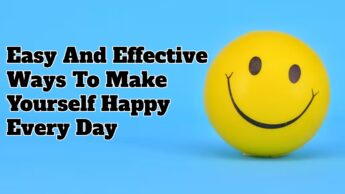Gratitude is highly linked to happy feelings and great experiences, and the explanation for this is straightforward. When you are grateful, you are reminded of good things that have happened in your life. Being grateful for these occurrences allows your mind to focus on the positive aspects of these experiences, which promotes a happy attitude. A cheerful attitude has been scientifically demonstrated to contribute to long-term happiness.
Dr. Robert Emmons, a psychology professor at the University of California, Davis, is the world’s foremost specialist on gratitude. Dr. Emmons and his University of Miami colleague Michael McCullough investigated the impact of writing gratitude diaries on nearly 200 college undergraduates in a 2003 study published in the Journal of Personality and Social Psychology. Students were placed into three groups, with each group writing ten weekly journals about gratitude (blessings), difficulties and annoyances, or neutral events. The gratitude group was told the following:
“There are many things in our lives, both large and small, that we might be grateful about. Think back over the past week and write down… up to five things in your life that you are grateful or thankful for.”
Those in the thankfulness condition reported feeling happier about their life overall, more optimistic about the future week, less physical symptoms, and spent more time exercising at the end of the 10 weeks. The gratitude condition, however, did not result in a more cheerful mood, as the researchers had predicted.
Concentrating on appreciation once a week was insufficient to affect the mood change. As a result, the researchers conducted a second study in which the diaries were kept once daily (for two weeks). They also substituted the group dealing with neutral life events with one where participants wrote about how they were better off than others (known as a downward social comparison). These instructions appeared to be similar to the thanksgiving instructions on the surface, but they were unlikely to yield the same results.
According to the findings, those in the gratitude condition had a more positive mood over the two weeks than those in the other groups, and they were also more likely to report doing acts of service, such as assisting someone with a problem or providing emotional support to others, as predicted by the researchers.
However, unlike the previous trial, thankfulness did not affect symptoms or health habits. The researchers determined that two weeks of appreciation might not be enough to produce long-term health advantages, so they decided to conduct a third study over a longer length of time, with a group that had greater health issues.
In the third trial, 65 persons with neuromuscular illness were invited to either write gratitude journals for 21 days or just complete out questionnaires about their mood, well-being, and health without receiving any treatment (control condition). In the thankfulness condition, participants’ partners were asked to score their mood and life satisfaction.
The gratitude group had more positive opinions of their lives as a whole than the control group, according to the findings. During the study period, they also reported a more positive and less negative mood daily. Their partners also claimed that the thankfulness participants were happier and more satisfied with their lives. In terms of health, the appreciation condition increased the amount and quality of sleep for individuals. Perhaps focusing on life’s blessings helped people sleep better at night by reducing stress and angst.
Keeping a thankfulness journal appears to be useful in any case. Specific thankfulness advantages appear to vary depending on what you’re comparing it to, whether you’re healthy or sick, and how often and for how long you practice gratitude. Filling out gratitude diaries each evening for two or three weeks appears to increase mood, optimism, and life satisfaction, as well as make you more motivated to help others.
You may need to keep the thankfulness journals for two or three months if you want to reap the health benefits of gratitude. This technique takes only five or ten minutes per day, yet it appears to redirect your mental compass toward focusing on the good when done consistently.
Keep reading successyeti.com
Also Read: Be Happy Not Because Everything Is Good But You Can See The Good In Everything





